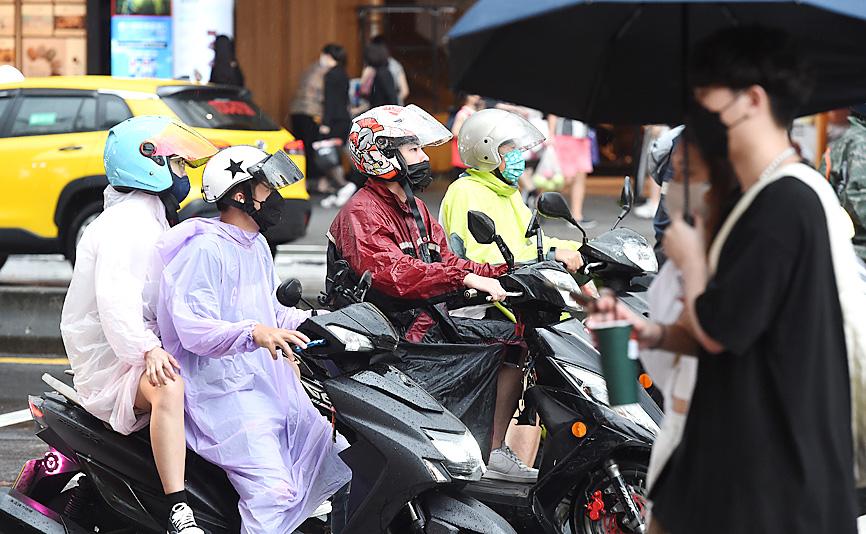Foreign nationals visiting Taiwan for six purposes are to be allowed entry starting on Monday next week, the Central Epidemic Command Center (CECC) announced yesterday, adding that people would no longer be required to wear a mask when riding a bike or a scooter, or when working in an open outdoor space, effective immediately.
Bureau of Consular Affairs Deputy Director Chou Chung-hsing (周中興) said the six purposes are volunteer work, missionary work, religious studies, internship, international exchange and foreigners on a working holiday.
Foreign nationals, not including residents of Hong Kong or Macau, who are planning to visit Taiwan for these six purposes can prepare the required documents and apply for a visa at the consular services office in their nation from Monday next week, he said.

Photo: Liao Chen-huei, Taipei Times
Foreigners eligible for the working holiday visas are limited to those from nations with reciprocal working holiday or youth exchange agreements with Taiwan, Chou said, adding that Taiwan has agreements with 17 nations and most have already allowed entry to Taiwanese, so they are included in the eligibility expansion based on the principles of equality and reciprocity.
There were about 10,000 people in the six categories who visited Taiwan each year before the COVID-19 pandemic, so considering the current inbound traveler cap of 40,000 people per week, allowing entry to these people should still be manageable, he said.
Meanwhile, Deputy Minister of Health and Welfare Victor Wang (王必勝), who heads the CECC, announced that domestic mask regulations have been slightly eased.
The changes include no longer requiring people to wear a mask when riding a bicycle, scooter or motorcycle, or when working in an open outdoor area, Wang said, adding that an open area means that the individual can keep a safe social distance from strangers and an example would be construction workers.
Asked if people must still wear a mask when taking a walk, Wang said taking a walk can be considered doing exercise, so wearing a mask is not required.
He also announced that Deputy Minister of Economic Affairs Chen Chern-chyi (陳正祺) and Deputy Minister of Transportation and Communications Chen Yen-po (陳彥伯) have joined the CECC’s team as deputy heads to assist the center in policies regarding resources preparation, economic revitalization, tourism development, hotel management, crowd flow and logistics.
Centers for Disease Control Director-General Chou Jih-haw (周志浩), head of the CECC’s disease surveillance division, said 26,779 new local infections and 367 imported cases were reported yesterday, as well as 37 deaths.
The caseload is slightly lower than Tuesday last week, but imported cases have been gradually increasing in the past five weeks, which reflects the trend in other nations and could be due to eased border control measures, Chou said, adding that the number of deaths is the lowest since May 16 and hopefully the number would continue to fall.

MAKING WAVES: China’s maritime militia could become a nontraditional threat in war, clogging up shipping lanes to prevent US or Japanese intervention, a report said About 1,900 Chinese ships flying flags of convenience and fishing vessels that participated in China’s military exercises around Taiwan last month and in January have been listed for monitoring, Coast Guard Administration (CGA) Deputy Director-General Hsieh Ching-chin (謝慶欽) said yesterday. Following amendments to the Commercial Port Act (商港法) and the Law of Ships (船舶法) last month, the CGA can designate possible berthing areas or deny ports of call for vessels suspected of loitering around areas where undersea cables can be accessed, Oceans Affairs Council Minister Kuan Bi-ling (管碧玲) said. The list of suspected ships, originally 300, had risen to about 1,900 as

DAREDEVIL: Honnold said it had always been a dream of his to climb Taipei 101, while a Netflix producer said the skyscraper was ‘a real icon of this country’ US climber Alex Honnold yesterday took on Taiwan’s tallest building, becoming the first person to scale Taipei 101 without a rope, harness or safety net. Hundreds of spectators gathered at the base of the 101-story skyscraper to watch Honnold, 40, embark on his daredevil feat, which was also broadcast live on Netflix. Dressed in a red T-shirt and yellow custom-made climbing shoes, Honnold swiftly moved up the southeast face of the glass and steel building. At one point, he stepped onto a platform midway up to wave down at fans and onlookers who were taking photos. People watching from inside

Japan’s strategic alliance with the US would collapse if Tokyo were to turn away from a conflict in Taiwan, Japanese Prime Minister Sanae Takaichi said yesterday, but distanced herself from previous comments that suggested a possible military response in such an event. Takaichi expressed her latest views on a nationally broadcast TV program late on Monday, where an opposition party leader criticized her for igniting tensions with China with the earlier remarks. Ties between Japan and China have sunk to the worst level in years after Takaichi said in November that a hypothetical Chinese attack on Taiwan could bring about a Japanese

The WHO ignored early COVID-19 warnings from Taiwan, US Deputy Secretary of Health and Human Services Jim O’Neill said on Friday, as part of justification for Washington withdrawing from the global health body. US Secretary of State Marco Rubio on Thursday said that the US was pulling out of the UN agency, as it failed to fulfill its responsibilities during the COVID-19 pandemic. The WHO “ignored early COVID warnings from Taiwan in 2019 by pretending Taiwan did not exist, O’Neill wrote on X on Friday, Taiwan time. “It ignored rigorous science and promoted lockdowns.” The US will “continue international coordination on infectious